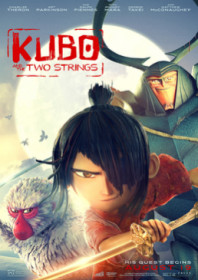
The fourth film from Travis Knight’s stop-motion Laika studios is a spellbinding, poignant adventure. For a film which exalts in the fantastical – from giant sea monsters to talking animals and mythical landscapes – it also packs a heart-wrenching emotional punch which hits with the same force as one of Kubo’s violently strummed power chords. In a magical, hyper-realised vision of ancient Japan, Kubo is a one-eyed child storyteller who can conjure up flying paper figures via his magical lute playing. His origami warriors also work as a clever device to showcase the artifice in the film’s extraordinary stop-motion animation, which is never less than mesmeric. Kubo lives in fear of the dark and cares for his amnesiac mother on an isolated cliff top, communicating only through stories as a way of disguising the truth about his troublesome upbringing. This is a theme which the film returns to repeatedly; the potency of imagination and how character, legacy and reality can be shaped through story-telling.
The film is also about loss, as Kubo soon discovers when two sinister floating apparitions in kabuki masks claiming to be his mother’s sisters appear on the eve of a lantern festival, demanding to steal his remaining eye. Kubo’s magical mother sacrifices herself to save the boy, sending him into a snow scene where his wooden monkey charm has come to life and lives as his protector. Monkey and Kubo befriend a dumb but loyal Samurai beetle claiming to have been taught by Kubo’s legendary deceased father. The film now enters a coming-of-age adventure section in which the unit become something of a dysfunctional family, as they travel through sea, sand and sky to locate three pieces of highly coveted armour. The armour is said to protect Kubo from his witch-like aunties and an ultimate showdown with the Moon King. This film exists in a constant swirl of creativity, never once settling in its vivid energy and excitement, with fabulous martial arts sequences and scarier moments which young viewers may find distressing. As a distillation of Japanese art, culture and heritage, it is a sparkling homage. As a mere feat of animation, there can be little else to rival it. And as a personal message of finding hope from tragedy, it has a resonance which is quite profound. And then it ends with the wonderful Regina Spektor covering a Beatles song. A perfect end to a perfect film.
- Country: United States
- Directed by: Travis Knight
- Starring: Art Parkinson, Charlize Theron, George Takei, Matthew McConaughey, Ralph Fiennes, Rooney Mara
- Produced by: Arianne Sutner, Travis Knight
- Written by: Chris Butler, Marc Haimes
- Studio: Laika












